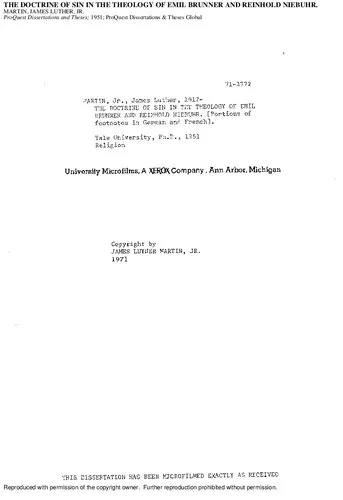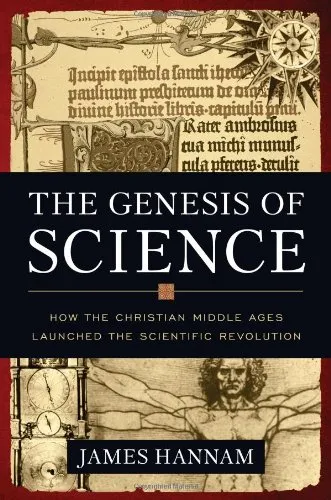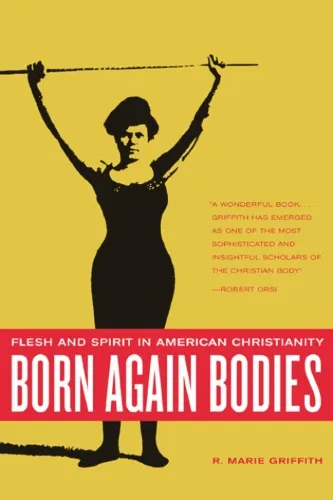THE DOCTRINE OF SIN IN THE THEOLOGY OF EMIL BRUNNER AND REINHOLD NIEBUHR.
4.0
Reviews from our users

You Can Ask your questions from this book's AI after Login
Each download or ask from book AI costs 2 points. To earn more free points, please visit the Points Guide Page and complete some valuable actions.Related Refrences:
Introduction to "The Doctrine of Sin in the Theology of Emil Brunner and Reinhold Niebuhr"
Sin has long been a pivotal topic within Christian theology, formulating how humanity perceives itself and its relationship with the divine. "The Doctrine of Sin in the Theology of Emil Brunner and Reinhold Niebuhr" delves deep into the theological frameworks of two significant Protestant thinkers of the 20th century. Both Brunner and Niebuhr have offered profound insights that continue to influence contemporary thought. This book systematically explores their views, bringing clarity and depth to this essential domain of theological inquiry.
Detailed Summary of the Book
The book embarks on a comprehensive journey through the theological landscapes shaped by Emil Brunner and Reinhold Niebuhr, specifically examining their interpretations of sin. It begins by establishing the historical and intellectual contexts from which both theologians emerged. Understanding that their perspectives were formed against the backdrop of tumultuous global events and existential challenges of the early to mid-20th century is crucial.
Emil Brunner’s approach to sin is examined through his emphasis on relationality with God and humanity’s estrangement due to sin. Brunner perceived sin not merely as an action but as a fundamental distortion of relationships, rooted deeply in human nature.
In contrast, Reinhold Niebuhr’s analysis of sin is explored through the lens of his famous dialectic of human nature - a tension between the finite and the infinite. Niebuhr's profound exploration of pride and self-deception as intrinsic elements of human sinfulness provides a critical understanding that is both philosophical and theological.
This book critically assesses the contributions of both theologians, highlighting their theological conversations with existentialism, cultural upheaval, and philosophical discourse of their time, ultimately weaving a rich narrative that underscores the enduring complexities surrounding the doctrine of sin.
Key Takeaways
- Emil Brunner's relational understanding of sin emphasizes humanity's separation from God as central to the human predicament.
- Reinhold Niebuhr's concept of sin reaches into the duality of human nature and the perilous balance between creativity and destructive pride.
- The historical contexts from which both theologians wrote are essential for understanding their views on sin and its implications for modern theology.
- The dialogue between Brunner and Niebuhr showcases diverse approaches within Reformed theology, reflecting on individual and collective implications of sin.
Famous Quotes from the Book
"To grasp the depth of sin is to encounter the radical nature of human estrangement from the divine order."
"Niebuhr's dialectic depicts a humanity constantly in tension, a perpetual divine wrestling."
Why This Book Matters
"The Doctrine of Sin in the Theology of Emil Brunner and Reinhold Niebuhr" is more than a scholarly exploration of religious thought. It serves as a bridge connecting modern readers with profound theological insights that continue to resonate today. Understanding these doctrines informs not only religious communities but also the wider discourse on morality, ethics, and human nature in a post-modern world. This book is vital for theologians, students, and anyone interested in how foundational aspects of Christian theology continue to address contemporary issues of moral and existential concern.
Free Direct Download
You Can Download this book after Login
Accessing books through legal platforms and public libraries not only supports the rights of authors and publishers but also contributes to the sustainability of reading culture. Before downloading, please take a moment to consider these options.
Find this book on other platforms:
WorldCat helps you find books in libraries worldwide.
See ratings, reviews, and discussions on Goodreads.
Find and buy rare or used books on AbeBooks.














